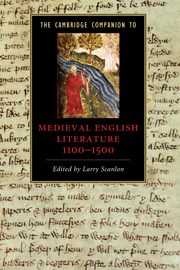11 - John Gower
from Part II - Authors
Published online by Cambridge University Press: 28 November 2009
Summary
“And for that fewe men endite . . . ”
In the early to mid 1470s, George Ashby's Active Policy of a Prince ranked the poet John Gower, his more famous contemporary Geoffrey Chaucer, and Chaucer's successor John Lydgate as the “Primier poetes of this nacion.” Ashby celebrated them as vernacular writers, responsible for rhetorical, linguistic, and formal innovations, which he associated with the formation of an English identity and saw as the starting point of a distinctive English literary tradition. Ashby's views were not unique, and, although gradually tastes changed to Gower's disadvantage, Gower, Chaucer, and Lydgate continued to be viewed as a triumvirate well into the sixteenth century. But how accurate is Ashby's appraisal of Gower's achievement, and is he justified in linking his name not just to Chaucer, but to Lydgate, and thus implicitly to other of Chaucer's disciples such as Thomas Hoccleve?
Relatively little is known about Gower's life. We are not certain when he was born (his birth date is taken to be 1330), or where he was brought up. We do not know anything definite about his education, or even about his choice of career, but the consensus, based largely on the evidence of “insider” knowledge displayed in his poetry and of surviving records of various property dealings, is that he trained as a lawyer. We do know that in the 1370s he moved to the Priory of St. Mary Overeys in Southwark, that in 1378 Chaucer granted him power of attorney when he traveled to Italy, that in 1398 Gower married, and that shortly after he went blind, and that in 1408 he died. It is also clear that toward the end of his life, Gower benefited from the patronage of Henry of Derby both before and after he became king. Gower's surviving poetry seems to have been written in the second half of his life, up to around 1400.
- Type
- Chapter
- Information
- The Cambridge Companion to Medieval English Literature 1100–1500 , pp. 153 - 164Publisher: Cambridge University PressPrint publication year: 2009



